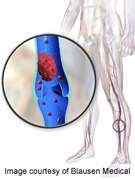For patients who survive a cerebral vein thrombosis, the long-term risk of mortality and recurrent venous thromboembolism seems to be low, according to a study published in the July issue of the Journal of Thrombosis and Haemostasis.
(HealthDay) -- For patients who survive a cerebral vein thrombosis (CVT), the long-term risk of mortality and recurrent venous thromboembolism (VTE) seems to be low, according to a study published in the July issue of the Journal of Thrombosis and Haemostasis.
Francesco Dentali, M.D., from the University of Insubria in Varese, Italy, and colleagues retrospectively assessed long-term mortality rates, residual disability, and recurrent VTE in an international cohort of 706 patients (73.7 percent female) with a first CVT episode who were followed for a median of 40 months (range, six to 297 months).
Over the follow-up period, the researchers found that 2.8 percent of patients died, 89.1 percent had a complete recovery (modified Rankin Score [mRS], 0 to 1), and 3.8 percent had a partial recovery and were independent (mRS, 2). The mean treatment duration was 12 months, during which time 84 percent of patients were treated with oral anticoagulants. CVT recurred in 4.4 percent of patients, and 6.5 percent had VTE in a different site, corresponding with an overall incidence of recurrence of 23.6 events per 1,000 patient-years and of 35.1 events per 1,000 patient years after anticoagulant therapy withdrawal. The only significant predictor of recurrence in multivariate analysis was a previous VTE (hazard ratio, 2.70).
"The long-term risk of mortality and recurrent VTE appears to be low in patients who survived the acute phase of CVT," the authors write.
More information:
Abstract
Full Text (subscription or payment may be required)
Copyright © 2012 HealthDay. All rights reserved.




















